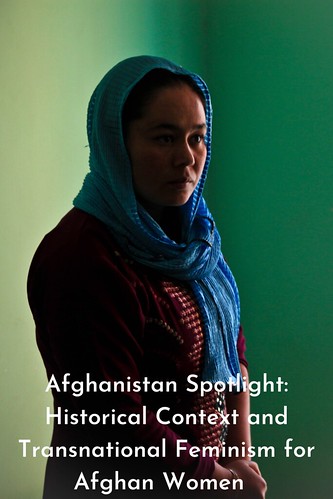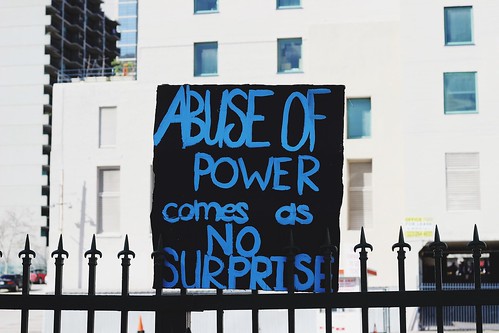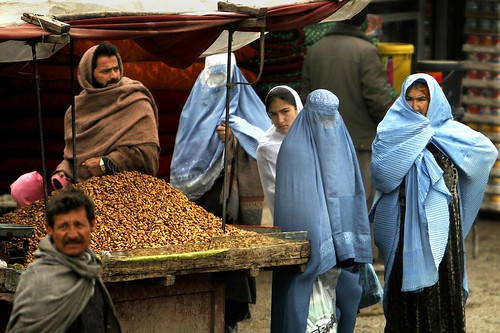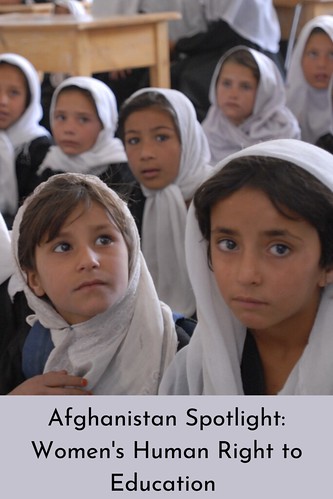Afghanistan Spotlight: Historical Context and Transnational Feminism for Afghan Women
Throughout time in the Middle East, women have been considered second class citizens and have had to fight for their basic human rights.

This article will focus on a historical context into Afghan women’s rights and further look into the importance of transnational feminism.

Historical Women’s Rights in Afghanistan
In Afghanistan, women gained equality under the 1964 constitution, which was only in place between 1964-1973. The goal of the 1964 Constitution was to move towards democracy and socioeconomic modernization, which included a bill of rights for all Afghans, including women.

However, these newly gained rights were taken away during the Taliban rule between 1996-2001. Under the Taliban regime, women were forced to wear the burqa at all times in public, were not allowed to work, were denied an education and were not allowed to leave their home or receive healthcare without a male chaperone. There were also public floggings and sometimes executions for violations of the Taliban’s laws, which left Afghan women living in constant fear.

The US invasion of Afghanistan in 2001 led to the removal of the Taliban regime, and the creation of the Islamic Republic of Afghanistan, a new government under President Hamid Karzai which was similar to pre-1990’s Afghanistan. To an extent, women’s rights improved. Then the creation of the 2004 Constitution of Afghanistan saw 27% of the 250 seats in the House of People were reserved for women and suggested that the importance of equality and women’s human rights were once again being acknowledged in Afghanistan.

This move towards a more equal Afghanistan suggested a move in the right direction for women’s rights, yet the current events taking place within Afghanistan events are starting to suggest otherwise.
Current Day Afghanistan
In September 2021, the United States left Afghanistan after 20 years; the Afghan President Ashraf Ghani fled Kabul as the Taliban took control and established a new all-male government. As women’s rights have become threatened by the Taliban regime, protests led by women advocating the importance of women’s human rights in Kabul have been met with violence by the Taliban security forces.
This reaction from the Taliban government illustrates that old principles during the 1996-2001 are evident within today’s Afghanistan, and poses an extremely dangerous environment for women—and furthermore their human and civil rights.

US Military Removal
On 30th August 2021, Dr. Debotri Dhar, a lecturer in women’s and gender studies at the University of Michigan, gave an interview in which she highlighted that the current situation in Afghanistan may worsen as time goes on, and further suggested that the United States and other world powers have some moral responsibility for it.
After full removal of all American troops from Afghanistan, the Taliban celebrated its liberation and freedom from what they considered the Imperial West. While the Biden Administration has been criticised for the way in which it departed from Afghanistan, leaving its citizens in fear over their uncertain future, Biden stands by this decision.
This removal has led to a push from the UK and France for the UNSC resolution, which calls on the Taliban to accept humanitarian aid, safeguard human rights, and prevent the country from becoming a haven for terrorism. However, during the previous regime, the Taliban authorities did not feel bound to UN codes or human rights laws, as they viewed this as a tool of Western Imperialism. Whether this attitude has changed in the current Taliban government is yet to be evidenced.
The UNSC resolution also calls for equal and meaningful participation of women, and upholding human rights, including for women, children, and minorities. However, the current actions by the Taliban government, including violence and restrictions on female education, suggest the previous Taliban statement that women’s rights will remain the same is not accurate.

With Afghan women’s rights under attack, it is important to consider transnational feminism and its role within modern day Afghanistan.
What is transnational feminism?
Transnational feminism is the theory concerned with how globalisation and capitalism affect people across nations, races, genders, classes, and sexualities.

Transnational feminism plays an important role in “forming solidarity amongst women living under diverse patriarchies united under the global system of economic exploitation.”
This is especially important in connection with the events in Afghanistan, as the West is traditionally associated with human rights, liberation, feminism, and freedom, while the East is regarded as poverty-stricken and violent, and depicted as needing saving.
This logic, also applied to Western and Eastern feminism and the role of the white western saviour within modern society, becomes evident and very dangerous.
What is the saviour complex?
The saviour complex is most commonly associated with Western colonialism acting as a ‘saviour’ for the East, or what is known as the ‘other’.
The outcry regarding global concerns for the safety of women in Afghanistan under the Taliban rule have been growing since the takeover in August 2021.
This has led to many feminists speaking out against this violation and urging the UN and especially the United States not to abandon Afghan women.
Yet the worry that one voice, from the West could be particularly louder is slightly concerning.
It can be argued that the US Government associates itself with the saviour complex in Afghanistan, especially concerning women’s rights. This becomes dangerous for the East, as by associating women’s rights with the West, the cycle of colonial rule becomes apparent once again, and the risk of white western feminism as a model becomes very threatening.
During the US invasion Afghan women were basically given two options, either live under oppression by Taliban rule or have ‘freedom’ under the Western invasion. It seemed that the women in Afghanistan were given no option concerning the future of their basic human rights.
This attitude of the white saviour complex from the US was evident during The American First Lady Laura Bush’s radio address to her country in November 2001:
‘Because of our recent military gains, in much of Afghanistan women are no longer imprisoned in their homes. They can listen to music and teach their daughters without fear of punishment.’
This statement from the First Lady illustrates the white saviour attitude during the US invasion and conveys Afghan women and girls as something that needed to be saved by the West.
Why do we need transnational feminism?
What is currently happening in Afghanistan is not only a concern for feminists, but for civil rights activists.
Transnational feminism is necessary, as in today’s society feminism is regarded as a product of the West, which can be dangerous and harmful to Eastern women. There needs to be a move away from western feminism being the overpowering voice in order to decolonise feminism globally.
How can the West be supportive?
It is extremely important to acknowledge that while it is expected that the UN and other governments will not negotiate with the Taliban and continue to freeze Afghan funds held overseas, however, does this help Afghan women?

Due to the halting of funds in Afghanistan the economic and public services are suffering, meaning Afghan citizens are facing threats from both the Taliban and those like the US who are stopping aid funding.
With regard to Afghan female teachers, it has been reported that since June 2021 they have not been paid. This situation has left the women in Afghanistan calling the international community, the World Bank, and international humanitarian agencies not to abandon Afghanistan at this difficult time.
However, on October 12th 2021, the EU announced a $1.2 billion aid package for Afghanistan, "to avert a major humanitarian and socio-economic collapse," said European Commission President Ursula von der Leyen.
While this is a good start from the international community, it is still not enough for the Afghan people, and the necessity in releasing aid funding is vital. In the West, we must understand how the releasing of funds is imperative to ensuring that 40 million people do not face a future of starvation and suffering.
In the West, we need to acknowledge the effect we have had over Afghan women and make sure we do not repeat the same mistakes again. We must apply transnational feminism to ensure Afghan women have their platform to speak and make decisions for themselves in order to ensure a safe and equal future.

Afghanistan Spotlight articles in this series:
Women’s Human Right to Education in Afghanistan

Afghanistan Spotlight: The Importance of International Cooperation for Afghan Women and Girls

Olivia Fraser is the Women and Children’s Human Rights Editor at Wandering Educators. She is currently studying a Master’s in Human Rights and Diplomacy at the University of Stirling. She is motivated by a desire to emphasise the importance of women’s human rights.



















